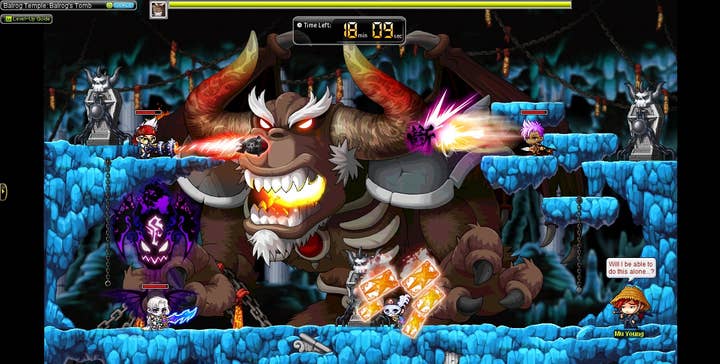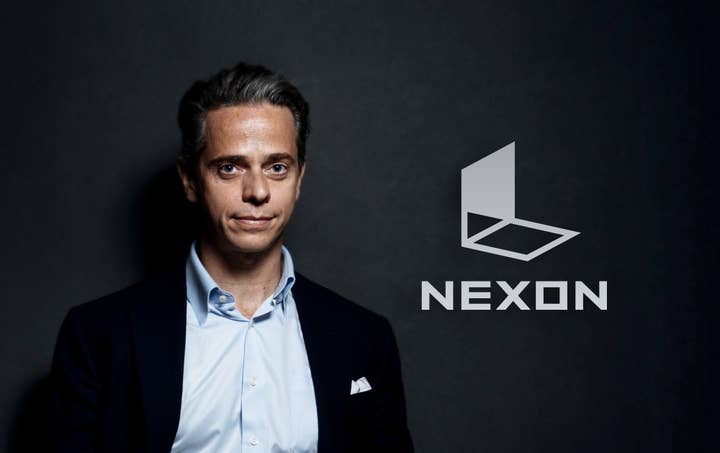Nexon wants to build a virtual theme park for the future
CEO Owen Mahoney on how the publisher plans to be at the forefront of "lean forward" entertainment
Three months ago, Nexon CEO Owen Mahoney and I chatted about how COVID-19 had thrown a spotlight on gaming in relation to the rest of entertainment.
At the time, he described a vision of the current state of online gaming as numerous virtual theme parks that users could actively experience, a business that he anticipated would only see further growth explosion in a world where passive, linear entertainment like movies, cruises, sports, and concerts were no longer possible.
Speaking to me again in the wake of the company's Q2 financials, Mahoney elaborates on that point further when I ask him about Nexon's stated plan to invest in multiple entertainment companies in the near future.
"If you think about the history of the entertainment and media industry, it's been largely a 'lean back' medium," Mahoney responds. "Someone tells you a story, or reads you a book, or plays you a song. You go to a theater or to a sporting event, and you go watch that -- so it's very, very one-way. Clearly, that's not the world that we're living in, going forward. It's very much 'lean forward.' It's very interactive. And Exhibit A of where this is happening is in the video games business."
"If you think about the history of the entertainment and media industry, it's been largely a 'lean back' medium... Clearly, that's not the world that we're living in"
Mahoney reiterates what he described to me back in May: that the games industry is at a major transition point, and that changes in how entertainment is consumed that have been underway for years now have been accelerated by COVID-19 as other forms of entertainment have taken a backseat to the activities possible within virtual worlds.
"We think that there's going to be a new generation of major entertainment companies," he continues. "Think about it: On January 1, who was the king of all media? It was clearly Disney. And Disney's business across the board has just been decimated by this transition to virtual that is required by COVID. And so we think that going forward, there's going to be a new class of winners. And we think that Nexon will be one of them if we play our cards right, if we execute well. But we think there's gonna be other IP and companies that win big as well.
"So with that as a backdrop, we think the question for us is, 'Who wins in this new world?' We want to invest in those companies. So the board authorized us to spend up to $1.5 billion of our roughly $5 billion in cash, to put into the companies that we think are going to win in this. We've spent about half of it so far since the announcement. We haven't announced who the companies are, but we think it's a good use of our cash."
Though Mahoney isn't able to say just yet who Nexon has invested in, he's able to give an example of the kind of entertainment concept the company's looking at in terms of where it might put its money. For Nexon, he says, IP is key.

"So you know the Marvel IP has been great for a very long time," he says, offering an illustrative example. "But we've only come to understand how valuable the Marvel IP is in the last five to ten years, as Disney has done a terrific job of, for lack of a better word, exploiting the IP, and making that IP real and leveraging it and harvesting it and investing more into it. But they bought that company when it was in bankruptcy 20 years ago and nobody wanted to buy them.
"In the entertainment industry, a lot of times you'll have these weird pricing things where people don't recognize it as a terrific IP, but then it has tons of potential. And so IP is one of those where there might be something that's got great potential that we think that we can do a lot with, we think somebody can do a lot with.
"If you read The Hollywood Reporter, or Variety, or Bloomberg, all the ink gets spilled about linear entertainment and sports and things like that -- like watching sports, leaning back and watching it. Our perspective indicates to us that all of us are going to be spending a lot more time in a much more interactive way in the future. So the valuations for those IPs are going to reflect that sort of difference of opinion. That's what makes a market interesting."
"Our view is those are the long waves; whatever choppiness happens in the short-term is overwhelmed by the long-term trend"
Given that Mahoney seems to be taking quite a long view of the industry with respect to the changes wrought by COVID-19, I ask him how he feels about concerns video games are seeing a surge now, but will ultimately not be recession-proof after all -- and might be in the same boat as so many other entertainment industries in a few quarters.
Mahoney acknowledges that this might happen in the coming year or so, but believes that ultimately, video games' place in relation to other entertainment industries is set for the long haul.
"People tend to look at the very short-term and they forget the long-term because it's hard for the human brain to think very long term," he says. "And we don't see this as a short-term thing at all, like everybody's going to suddenly go back. We see this as part of a long-term shift that we've been perceiving for a very long time.
"...Our view is those are the long waves; whatever choppiness happens in the short-term is overwhelmed by the long-term trend. People look for a story. They say, 'Oh, COVID happened, so we have one thing. And then when COVID goes away, you're gonna have this opposite thing.' Yeah, there may be bumps in the road. But the long-term trend is clear in our mind.
"There's also a generational shift. People who tend to write about traditional entertainment tend to be an older generation. They didn't grow up on video games like you and I did. They have a harder time seeing it. My kids have no interest in sitting back and going to a movie theater for two hours. It's just not a part of their entertainment life. They want to think about and strategize and talk to their friends about video games. And their friends are like that as well."
Mahoney's focus on video games as virtual theme parks carries over into his thinking about next-generation consoles as well. He says Nexon is increasingly interested in mobile games due to the overwhelming prevalence of attachment rates for powerful smartphones around the world, but acknowledges the company will look at consoles too.
"Whether it's an iPad or a Google phone or an Xbox or a PC, those things are just access points into that virtual world that I want to go to"
He says Nexon is less interested in what platforms are necessarily available at any one time, and more focused on ensuring the company exists wherever its audience happens to be.
"My view is that there is a virtual world. It exists somewhere in the cloud, and all these different things are just access points into that virtual world. And I want to live in that virtual world. What matters to me as a gamer is: What's the economy? What's the sociology? What's the world that I'm living in? And I'll access that wherever I can, as a gamer, in all these different things, whether it's an iPad or a Google phone or an Xbox or a PC. Those things are just access points into that virtual world that I want to go to."
Finally, I ask Mahoney about the recent closure of Nexon OC in July, as well as the closure of two other US offices a year ago, perhaps pointing to a trend of Nexon trying to move its business out of the West.
Mahoney denies that's the reason, saying instead that Nexon considers the time we're in now as "super early innings" both in the West and worldwide. Instead, this is just part of Nexon's move to consolidate its focuses on fewer, bigger, more targeted projects.
"We just want to do online games in virtual worlds: deeply online, immersive, online games and virtual worlds," he says. "For lack of a better analogy, a virtual theme park. And that's a very particular skill set. But in order to pull that off really well, we've got to focus on a few things. And we've got to focus on the best ideas, and we have to not do other stuff.
"So for example, last year, we shut down our Emeryville office that's in Northern California, and we consolidated that with our publishing group in LA. Why did we do that? Well, mobile used to be a very separate business. What was required to publish on mobile, especially in the world of casual games, was a very separate business and what made you good at that was different than what made you good at PC. Today, a mobile device is essentially a PC in terms of GPU. So publishing becomes very, very similar in those two worlds. So we consolidate that.
"In terms of the studios, we really just want to put our resources in the best ideas and we think it's a matter of consolidating around the best IP, the best development ideas, and so on."

